Deck 7: Applications of Integration
Question
Question
Question
Question
Question
Question
Question
Question
Question
Question
Question
Question
Question
Question
Question
Question
Question
Question
Question
Question
Question
Question
Question
Question
Question
Question
Question
Question
Question
Question
Question
Question
Question
Question
Question
Question
Question
Question
Question
Question
Question
Question
Question
Question
Question
Question
Question
Question
Question
Question
Question
Question
Question
Question
Question
Question
Question
Question
Question
Question
Question
Question
Question
Question
Question
Question
Question
Question
Question
Question
Question
Question
Question
Question
Question
Question
Question
Question
Question
Question

Unlock Deck
Sign up to unlock the cards in this deck!
Unlock Deck
Unlock Deck
1/90
Play
Full screen (f)
Deck 7: Applications of Integration
1
Which of the following expressions gives the volume of a solid whose base in the xy-plane is region Q and whose cross sections,perpendicular to the x-axis,are squares with a side in the xy-plane?
A)
B)
C)
D)
A)

B)

C)

D)



2
In the closed interval  ,if
,if  ,for what value of k does the region bounded by
,for what value of k does the region bounded by  and the line
and the line  have the same area as that bounded by
have the same area as that bounded by  and the x-axis?
and the x-axis? 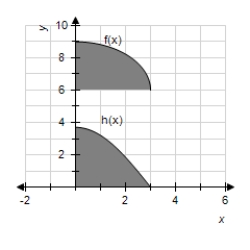
A)
B)
C)
D)
 ,if
,if  ,for what value of k does the region bounded by
,for what value of k does the region bounded by  and the line
and the line  have the same area as that bounded by
have the same area as that bounded by  and the x-axis?
and the x-axis? 
A)

B)

C)

D)



3
For Question 5,region W is bounded by  ,
,  ,
,  ,and
,and  .
.
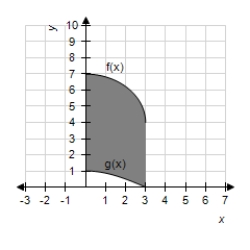
What is the area of the region W?
A)12
B)
C)
D)
 ,
,  ,
,  ,and
,and  .
.

What is the area of the region W?
A)12
B)

C)

D)



4
Air is being pumped into a spherical balloon at the rate of  cm3/min,but there is a small hole in the balloon and at the same time air is leaking out at the rate of
cm3/min,but there is a small hole in the balloon and at the same time air is leaking out at the rate of  cm3/min.
cm3/min.
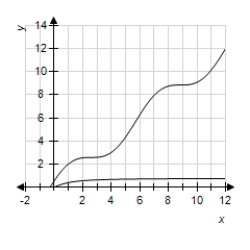
Which of the following is true for ,where t is measured in minutes?
,where t is measured in minutes?
A) represents the volume of the balloon after the first 10 minutes.
represents the volume of the balloon after the first 10 minutes.
B) represents the increase in volume each minute during the first 10 minutes.
represents the increase in volume each minute during the first 10 minutes.
C) represents the increase in volume during the first 10 minutes.
represents the increase in volume during the first 10 minutes.
D)
 cm3/min,but there is a small hole in the balloon and at the same time air is leaking out at the rate of
cm3/min,but there is a small hole in the balloon and at the same time air is leaking out at the rate of  cm3/min.
cm3/min.

Which of the following is true for
 ,where t is measured in minutes?
,where t is measured in minutes?
A)
 represents the volume of the balloon after the first 10 minutes.
represents the volume of the balloon after the first 10 minutes.B)
 represents the increase in volume each minute during the first 10 minutes.
represents the increase in volume each minute during the first 10 minutes.C)
 represents the increase in volume during the first 10 minutes.
represents the increase in volume during the first 10 minutes.D)


Unlock Deck
Unlock for access to all 90 flashcards in this deck.
Unlock Deck
k this deck
5
Let f be the function given by  as shown in the sketch below,where the region R is bounded by the graph of
as shown in the sketch below,where the region R is bounded by the graph of  ,the y-axis,and the horizontal line
,the y-axis,and the horizontal line  .
.
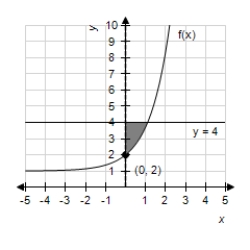
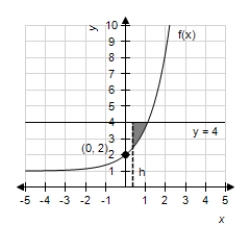
Find the area of the region R.
 as shown in the sketch below,where the region R is bounded by the graph of
as shown in the sketch below,where the region R is bounded by the graph of  ,the y-axis,and the horizontal line
,the y-axis,and the horizontal line  .
.


Find the area of the region R.

Unlock Deck
Unlock for access to all 90 flashcards in this deck.
Unlock Deck
k this deck
6
Which of the following expressions gives the volume when region R is rotated about the line  ?
?
A)
B)
C)
D)
 ?
? A)

B)

C)

D)


Unlock Deck
Unlock for access to all 90 flashcards in this deck.
Unlock Deck
k this deck
7
Find the arc length of the graph of the function  over the interval
over the interval  .
.
A)
B)
C)
D)
E)
 over the interval
over the interval  .
. A)

B)

C)

D)

E)


Unlock Deck
Unlock for access to all 90 flashcards in this deck.
Unlock Deck
k this deck
8
For problems 3 and 4,region Q is bounded by  ,
,  ,
,  and
and  .
.
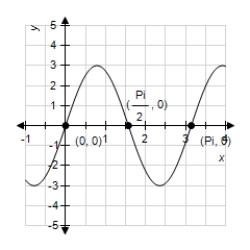
What is the area of region?
A)0
B)1.5
C)
D)3
 ,
,  ,
,  and
and  .
.

What is the area of region?
A)0
B)1.5
C)

D)3

Unlock Deck
Unlock for access to all 90 flashcards in this deck.
Unlock Deck
k this deck
9
The velocity of a particle moving along a line is given by  for the interval
for the interval  .
.
How far to the right of the starting point will the particle be at ?
?
A)2.212
B)1.548
C)3.318
D)4.424
 for the interval
for the interval  .
.How far to the right of the starting point will the particle be at
 ?
? A)2.212
B)1.548
C)3.318
D)4.424

Unlock Deck
Unlock for access to all 90 flashcards in this deck.
Unlock Deck
k this deck
10
The base of a solid is bounded by  and
and  in the xy-plane,as shown in the figure below.Each cross section perpendicular to the x-axis is a rectangle with one side in the xy-plane and whose height is 2.What is the volume of the solid?
in the xy-plane,as shown in the figure below.Each cross section perpendicular to the x-axis is a rectangle with one side in the xy-plane and whose height is 2.What is the volume of the solid? 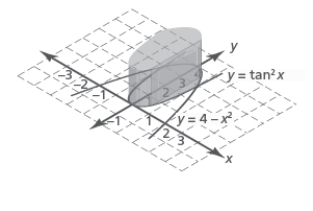
A)3.121
B)4.454
C)6.243
D)12.486
 and
and  in the xy-plane,as shown in the figure below.Each cross section perpendicular to the x-axis is a rectangle with one side in the xy-plane and whose height is 2.What is the volume of the solid?
in the xy-plane,as shown in the figure below.Each cross section perpendicular to the x-axis is a rectangle with one side in the xy-plane and whose height is 2.What is the volume of the solid? 
A)3.121
B)4.454
C)6.243
D)12.486

Unlock Deck
Unlock for access to all 90 flashcards in this deck.
Unlock Deck
k this deck
11
A horizontal line  ,where k is greater than 4,is chosen so that the volume of the solid formed when region R is rotated about the line
,where k is greater than 4,is chosen so that the volume of the solid formed when region R is rotated about the line  is twice the volume of the solid found in part (c).Set up,but do not evaluate,an integral expression in terms of a single independent variable which represents the volume of this solid.
is twice the volume of the solid found in part (c).Set up,but do not evaluate,an integral expression in terms of a single independent variable which represents the volume of this solid.
 ,where k is greater than 4,is chosen so that the volume of the solid formed when region R is rotated about the line
,where k is greater than 4,is chosen so that the volume of the solid formed when region R is rotated about the line  is twice the volume of the solid found in part (c).Set up,but do not evaluate,an integral expression in terms of a single independent variable which represents the volume of this solid.
is twice the volume of the solid found in part (c).Set up,but do not evaluate,an integral expression in terms of a single independent variable which represents the volume of this solid.
Unlock Deck
Unlock for access to all 90 flashcards in this deck.
Unlock Deck
k this deck
12
Region G is bounded by the curve  ,
,  ,and the x-axis.Order from smallest to largest the volumes determined when G is rotated about the axes:
,and the x-axis.Order from smallest to largest the volumes determined when G is rotated about the axes:
i. II.
II.  III.
III. 
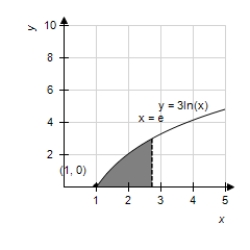
A)
B)
C)
D)
 ,
,  ,and the x-axis.Order from smallest to largest the volumes determined when G is rotated about the axes:
,and the x-axis.Order from smallest to largest the volumes determined when G is rotated about the axes: i.
 II.
II.  III.
III. 

A)

B)

C)

D)


Unlock Deck
Unlock for access to all 90 flashcards in this deck.
Unlock Deck
k this deck
13
If the position of the particle at time  is −1,then what is the position of the particle when it is farthest to the right on this time interval?
is −1,then what is the position of the particle when it is farthest to the right on this time interval?
A)2.212
B)6.702
C)13.191
D)10.053
 is −1,then what is the position of the particle when it is farthest to the right on this time interval?
is −1,then what is the position of the particle when it is farthest to the right on this time interval? A)2.212
B)6.702
C)13.191
D)10.053

Unlock Deck
Unlock for access to all 90 flashcards in this deck.
Unlock Deck
k this deck
14
What is the distance that the particle has traveled on this time interval?
A)2.212
B)6.596
C)9.234
D)13.191
A)2.212
B)6.596
C)9.234
D)13.191

Unlock Deck
Unlock for access to all 90 flashcards in this deck.
Unlock Deck
k this deck
15
Find the combined area of the two regions bounded by the curves  and
and  as shown in the figure bellow.
as shown in the figure bellow. 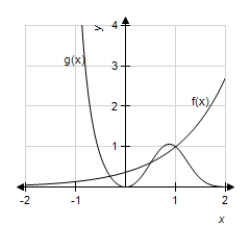
A)0.073
B)0.203
C)0.276
D)0.828
 and
and  as shown in the figure bellow.
as shown in the figure bellow. 
A)0.073
B)0.203
C)0.276
D)0.828

Unlock Deck
Unlock for access to all 90 flashcards in this deck.
Unlock Deck
k this deck
16
Find the volume of the solid formed when region R is rotated about the line  .
.
 .
.
Unlock Deck
Unlock for access to all 90 flashcards in this deck.
Unlock Deck
k this deck
17
Which of the following expressions represents the volume of the solid generated when the region bounded by  and
and  is rotated about the line
is rotated about the line  ?
?
A)
B)
C)
D)
 and
and  is rotated about the line
is rotated about the line  ?
? A)

B)

C)

D)


Unlock Deck
Unlock for access to all 90 flashcards in this deck.
Unlock Deck
k this deck
18
A vertical line  ,where
,where  is chosen so that the area of the region bounded by
is chosen so that the area of the region bounded by  ,the y-axis,the horizontal line
,the y-axis,the horizontal line  ,and the line
,and the line  is half the area of region R.What is the value of h?
is half the area of region R.What is the value of h?
 ,where
,where  is chosen so that the area of the region bounded by
is chosen so that the area of the region bounded by  ,the y-axis,the horizontal line
,the y-axis,the horizontal line  ,and the line
,and the line  is half the area of region R.What is the value of h?
is half the area of region R.What is the value of h?
Unlock Deck
Unlock for access to all 90 flashcards in this deck.
Unlock Deck
k this deck
19
Which of the following expressions gives the area of region R?
A)
B)
C)
D)
A)

B)

C)

D)


Unlock Deck
Unlock for access to all 90 flashcards in this deck.
Unlock Deck
k this deck
20
The revenue and expenditures for a small company are analyzed and predicted for the next 5 years.The current annual revenue is $110,000 and growing at an annual rate of 30%,while the expenditures are modeled with a sinusoidal function.If  and
and  ,to the nearest dollar,what is the average annual profit for the company when the expenditures reach a maximum value on the interval
,to the nearest dollar,what is the average annual profit for the company when the expenditures reach a maximum value on the interval  ?
?
A)191,441
B)159,534
C)119,651
D)79,767
 and
and  ,to the nearest dollar,what is the average annual profit for the company when the expenditures reach a maximum value on the interval
,to the nearest dollar,what is the average annual profit for the company when the expenditures reach a maximum value on the interval  ?
? A)191,441
B)159,534
C)119,651
D)79,767

Unlock Deck
Unlock for access to all 90 flashcards in this deck.
Unlock Deck
k this deck
21
Find the arc length of the graph of the function  over the interval
over the interval  .
.
A)
B)
C)
D)
E)
 over the interval
over the interval  .
. A)

B)

C)

D)

E)


Unlock Deck
Unlock for access to all 90 flashcards in this deck.
Unlock Deck
k this deck
22
Find the area of the surface generated by revolving the curve about the y-axis.  ,
, 
A)
B)
C)
D)
E)
 ,
, 
A)

B)

C)

D)

E)


Unlock Deck
Unlock for access to all 90 flashcards in this deck.
Unlock Deck
k this deck
23
A bridge has a main span of about 1,200 meters.Each of its towers has a height of about 150 meters.Approximate the length of a parabolic cable along the main span if the length C of the cable is given by  .Round your answer to one decimal place.
.Round your answer to one decimal place. 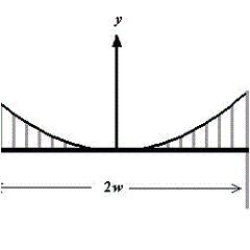
A)624.1 meters
B)671.8 meters
C)1,825.7 meters
D)1,248.3 meters
E)2,496.5 meters
 .Round your answer to one decimal place.
.Round your answer to one decimal place. 
A)624.1 meters
B)671.8 meters
C)1,825.7 meters
D)1,248.3 meters
E)2,496.5 meters

Unlock Deck
Unlock for access to all 90 flashcards in this deck.
Unlock Deck
k this deck
24
Use the integration capabilities of a graphing utility to approximate the arc length of the graph of  on the interval
on the interval  .Round your answer to three decimal places.
.Round your answer to three decimal places.
A)10.340
B)11.740
C)5.270
D)10.540
E)7.640
 on the interval
on the interval  .Round your answer to three decimal places.
.Round your answer to three decimal places. A)10.340
B)11.740
C)5.270
D)10.540
E)7.640

Unlock Deck
Unlock for access to all 90 flashcards in this deck.
Unlock Deck
k this deck
25
Find the arc length of the graph of the function  over the interval
over the interval  .
.
A)
B)
C)
D)
E)
 over the interval
over the interval  .
. A)

B)

C)

D)

E)


Unlock Deck
Unlock for access to all 90 flashcards in this deck.
Unlock Deck
k this deck
26
Use the shell method to set up and evaluate an integral that gives the volume of the solid generated by revolving the plane region about the y-axis.  ,
, 
A)
B)
C)
D)
E)
 ,
, 
A)

B)

C)

D)

E)


Unlock Deck
Unlock for access to all 90 flashcards in this deck.
Unlock Deck
k this deck
27
Find the area of the surface generated by revolving the curve about the x-axis.  ,
, 
A)
B)
C)
D)
E)
 ,
, 
A)

B)

C)

D)

E)


Unlock Deck
Unlock for access to all 90 flashcards in this deck.
Unlock Deck
k this deck
28
Find the area of the surface generated by revolving the curve about the y-axis.  ,
, 
A)
B)
C)
D)
E)
 ,
, 
A)

B)

C)

D)

E)


Unlock Deck
Unlock for access to all 90 flashcards in this deck.
Unlock Deck
k this deck
29
Find the arc length of the graph of the function  over the interval
over the interval  .
.
A)
B)
C)
D)
E)
 over the interval
over the interval  .
. A)

B)

C)

D)

E)


Unlock Deck
Unlock for access to all 90 flashcards in this deck.
Unlock Deck
k this deck
30
Electrical wires suspended between two towers form a catenary modeled by the equation  ,
,  ,where x and y are measured in meters.The towers are 50 meters apart.Find the length of the suspended cable.Round your answer to three decimal places.
,where x and y are measured in meters.The towers are 50 meters apart.Find the length of the suspended cable.Round your answer to three decimal places. 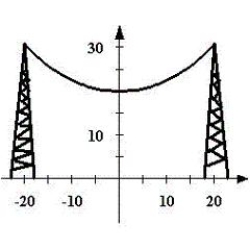
A)94.421 m
B)50.000 m
C)64.077 m
D)40.048 m
E)47.211 m
 ,
,  ,where x and y are measured in meters.The towers are 50 meters apart.Find the length of the suspended cable.Round your answer to three decimal places.
,where x and y are measured in meters.The towers are 50 meters apart.Find the length of the suspended cable.Round your answer to three decimal places. 
A)94.421 m
B)50.000 m
C)64.077 m
D)40.048 m
E)47.211 m

Unlock Deck
Unlock for access to all 90 flashcards in this deck.
Unlock Deck
k this deck
31
Find the arc length of the graph of the function  over the interval
over the interval  .
.
A)
B)
C)
D)
E)
 over the interval
over the interval  .
. A)

B)

C)

D)

E)


Unlock Deck
Unlock for access to all 90 flashcards in this deck.
Unlock Deck
k this deck
32
Use the shell method to set up and evaluate the integral that gives the volume of the solid generated by revolving the plane region about the y-axis.  ,
,  ,
, 
A)
B)
C)
D)
E)
 ,
,  ,
, 
A)

B)

C)

D)

E)


Unlock Deck
Unlock for access to all 90 flashcards in this deck.
Unlock Deck
k this deck
33
Use the shell method to set up and evaluate the integral that gives the volume of the solid generated by revolving the plane region about the y-axis. 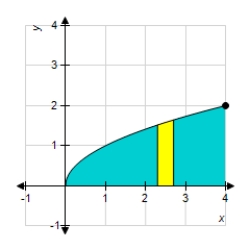
A)
B)
C)
D)
E)

A)

B)

C)

D)

E)


Unlock Deck
Unlock for access to all 90 flashcards in this deck.
Unlock Deck
k this deck
34
Find the arc length of the graph of the function  over the interval
over the interval  .
.
A)
B)
C)
D)
E)
 over the interval
over the interval  .
. A)

B)

C)

D)

E)


Unlock Deck
Unlock for access to all 90 flashcards in this deck.
Unlock Deck
k this deck
35
Set up and evaluate the definite integral for the area of the surface formed by revolving the graph of  ,
,  about the x-axis.
about the x-axis.
A)
B)
C)
D)
E)
 ,
,  about the x-axis.
about the x-axis. A)

B)

C)

D)

E)


Unlock Deck
Unlock for access to all 90 flashcards in this deck.
Unlock Deck
k this deck
36
Set up and evaluate the definite integral for the area of the surface formed by revolving the graph of  about the y-axis.Round your answer to three decimal places.
about the y-axis.Round your answer to three decimal places. 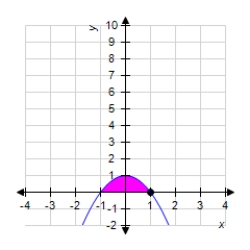
A)2.665
B)5.33
C)11.708
D)1.294
E)0.647
 about the y-axis.Round your answer to three decimal places.
about the y-axis.Round your answer to three decimal places. 
A)2.665
B)5.33
C)11.708
D)1.294
E)0.647

Unlock Deck
Unlock for access to all 90 flashcards in this deck.
Unlock Deck
k this deck
37
An ornamental light bulb is designed by revolving the graph of  about the x-axis where x and y are measured in feet.Approximate the amount of glass needed to make the bulb.(Assume that the glass is 0.015 inches thick. )Round your answer to four decimal places.
about the x-axis where x and y are measured in feet.Approximate the amount of glass needed to make the bulb.(Assume that the glass is 0.015 inches thick. )Round your answer to four decimal places. 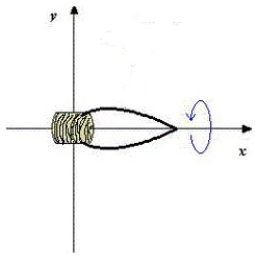
A)0.09 in.3
B)0.0006 in.3
C)1.0795 in.3
D)0.0075 in.3
E)5.9971 in.3
 about the x-axis where x and y are measured in feet.Approximate the amount of glass needed to make the bulb.(Assume that the glass is 0.015 inches thick. )Round your answer to four decimal places.
about the x-axis where x and y are measured in feet.Approximate the amount of glass needed to make the bulb.(Assume that the glass is 0.015 inches thick. )Round your answer to four decimal places. 
A)0.09 in.3
B)0.0006 in.3
C)1.0795 in.3
D)0.0075 in.3
E)5.9971 in.3

Unlock Deck
Unlock for access to all 90 flashcards in this deck.
Unlock Deck
k this deck
38
Find the area of the surface generated by revolving the curve about the x-axis.  ,
, 
A)
B)
C)
D)
E)
 ,
, 
A)

B)

C)

D)

E)


Unlock Deck
Unlock for access to all 90 flashcards in this deck.
Unlock Deck
k this deck
39
A barn is 100 feet long and 40 feet wide.A cross section of the roof is the inverted catenary  .Find the number of square feet of roofing on the barn.Round your answer to the nearest integer.
.Find the number of square feet of roofing on the barn.Round your answer to the nearest integer. 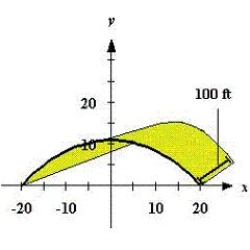
A)4,681 square feet
B)4,701 square feet
C)2,351 square feet
D)2,000 square feet
E)4,000 square feet
 .Find the number of square feet of roofing on the barn.Round your answer to the nearest integer.
.Find the number of square feet of roofing on the barn.Round your answer to the nearest integer. 
A)4,681 square feet
B)4,701 square feet
C)2,351 square feet
D)2,000 square feet
E)4,000 square feet

Unlock Deck
Unlock for access to all 90 flashcards in this deck.
Unlock Deck
k this deck
40
Find the arc length from  clockwise to
clockwise to  along the circle
along the circle  .Round your answer to four decimal places.
.Round your answer to four decimal places.
A)5.4264
B)0.1107
C)0.1137
D)4.3417
E)5.5692
 clockwise to
clockwise to  along the circle
along the circle  .Round your answer to four decimal places.
.Round your answer to four decimal places. A)5.4264
B)0.1107
C)0.1137
D)4.3417
E)5.5692

Unlock Deck
Unlock for access to all 90 flashcards in this deck.
Unlock Deck
k this deck
41
Use the disk or the shell method to find the volume of the solid generated by revolving the region bounded by the graphs of the equations  ,
,  ,
,  ,
,  about the x-axis.Round your answer to two decimal places.
about the x-axis.Round your answer to two decimal places.
A)192.00
B)8.37
C)21.30
D)66.93
E)100.53
 ,
,  ,
,  ,
,  about the x-axis.Round your answer to two decimal places.
about the x-axis.Round your answer to two decimal places. A)192.00
B)8.37
C)21.30
D)66.93
E)100.53

Unlock Deck
Unlock for access to all 90 flashcards in this deck.
Unlock Deck
k this deck
42
Use the disk or the shell method to find the volume of the solid generated by revolving the region bounded by the graphs of the equations  ,
,  ,
,  about the x-axis.
about the x-axis.
A)
B)
C)
D)
E)
 ,
,  ,
,  about the x-axis.
about the x-axis. A)

B)

C)

D)

E)


Unlock Deck
Unlock for access to all 90 flashcards in this deck.
Unlock Deck
k this deck
43
Use the disk or shell method to find the volume of the solid generated by revolving the region in the first quadrant bounded by the graph of the equation about the given line. 
(i)the x-axis; (ii)the y-axis
A)(i) ; (ii)
; (ii)

B)(i) ; (ii)
; (ii)

C)(i) ; (ii)
; (ii)

D)(i) ; (ii)
; (ii)

E)(i) ; (ii)
; (ii)


(i)the x-axis; (ii)the y-axis
A)(i)
 ; (ii)
; (ii)
B)(i)
 ; (ii)
; (ii)
C)(i)
 ; (ii)
; (ii)
D)(i)
 ; (ii)
; (ii)
E)(i)
 ; (ii)
; (ii)

Unlock Deck
Unlock for access to all 90 flashcards in this deck.
Unlock Deck
k this deck
44
Find the volume of the solid generated by revolving the region bounded by the graphs of the equations  ,
,  ,and
,and  about the line
about the line  .
.
A)
B)
C)
D)
E)
 ,
,  ,and
,and  about the line
about the line  .
. A)

B)

C)

D)

E)


Unlock Deck
Unlock for access to all 90 flashcards in this deck.
Unlock Deck
k this deck
45
A solid is generated by revolving the region bounded by  and
and  about the y-axis.A hole,centered along the axis of revolution,is drilled through this solid so that one-third of the volume is removed.Find the diameter of the hole.Round your answer to three decimal places.
about the y-axis.A hole,centered along the axis of revolution,is drilled through this solid so that one-third of the volume is removed.Find the diameter of the hole.Round your answer to three decimal places.
A)5.774
B)2.887
C)2.433
D)9.419
E)4.867
 and
and  about the y-axis.A hole,centered along the axis of revolution,is drilled through this solid so that one-third of the volume is removed.Find the diameter of the hole.Round your answer to three decimal places.
about the y-axis.A hole,centered along the axis of revolution,is drilled through this solid so that one-third of the volume is removed.Find the diameter of the hole.Round your answer to three decimal places. A)5.774
B)2.887
C)2.433
D)9.419
E)4.867

Unlock Deck
Unlock for access to all 90 flashcards in this deck.
Unlock Deck
k this deck
46
Use the disk or shell method to find the volume of the solid generated by revolving the region bounded by the graphs of the equations about the line  .
.  ,
,  ,
,  ,
, 
A)
B)
C)
D)
E)
 .
.  ,
,  ,
,  ,
, 
A)

B)

C)

D)

E)


Unlock Deck
Unlock for access to all 90 flashcards in this deck.
Unlock Deck
k this deck
47
Set up and evaluate the integral that gives the volume of the solid formed by revolving the region bounded by  and
and  in the first quadrant about the y-axis.
in the first quadrant about the y-axis.
A)
B)
C)
D)
E)
 and
and  in the first quadrant about the y-axis.
in the first quadrant about the y-axis. A)

B)

C)

D)

E)


Unlock Deck
Unlock for access to all 90 flashcards in this deck.
Unlock Deck
k this deck
48
Use the shell method to find the volume of the solid generated by revolving the plane region about the line  .
.  ,
,  ,
, 
A)
B)
C)
D)
E)
 .
.  ,
,  ,
, 
A)

B)

C)

D)

E)


Unlock Deck
Unlock for access to all 90 flashcards in this deck.
Unlock Deck
k this deck
49
Use the shell method to set up and evaluate the integral that gives the volume of the solid generated by revolving the plane region about the x-axis.  ,
,  ,
, 
A)
B)
C)
D)
E)
 ,
,  ,
, 
A)

B)

C)

D)

E)


Unlock Deck
Unlock for access to all 90 flashcards in this deck.
Unlock Deck
k this deck
50
Use the shell method to set up and evaluate the integral that gives the volume of the solid generated by revolving the plane region about the x-axis.  ,
,  ,
, 
A)
B)
C)
D)
E)
 ,
,  ,
, 
A)

B)

C)

D)

E)


Unlock Deck
Unlock for access to all 90 flashcards in this deck.
Unlock Deck
k this deck
51
Set up and evaluate the integral that gives the volume of the solid formed by revolving the region bounded by  ,
,  ,and
,and  about the y-axis.
about the y-axis.
A)
B)
C)
D)
E)
 ,
,  ,and
,and  about the y-axis.
about the y-axis. A)

B)

C)

D)

E)


Unlock Deck
Unlock for access to all 90 flashcards in this deck.
Unlock Deck
k this deck
52
Set up and evaluate the integral that gives the volume of the solid formed by revolving the region bounded by  and
and  about the x-axis.
about the x-axis.
A)
B)
C)
D)
E)
 and
and  about the x-axis.
about the x-axis. A)

B)

C)

D)

E)


Unlock Deck
Unlock for access to all 90 flashcards in this deck.
Unlock Deck
k this deck
53
Use the shell method to set up and evaluate the integral that gives the volume of the solid generated by revolving the plane region bounded by  ,
,  ,
,  about the x-axis.
about the x-axis.
A)
B)
C)
D)
E)
 ,
,  ,
,  about the x-axis.
about the x-axis. A)

B)

C)

D)

E)


Unlock Deck
Unlock for access to all 90 flashcards in this deck.
Unlock Deck
k this deck
54
A solid is generated by revolving the region bounded by  and
and  about the y-axis.A hole,centered along the axis of revolution,is drilled through this solid so that one-fourth of the volume is removed.Find the diameter of the hole.Round your answer to three decimal places.
about the y-axis.A hole,centered along the axis of revolution,is drilled through this solid so that one-fourth of the volume is removed.Find the diameter of the hole.Round your answer to three decimal places.
A)12.522
B)13.028
C)5.124
D)2.739
E)10.249
 and
and  about the y-axis.A hole,centered along the axis of revolution,is drilled through this solid so that one-fourth of the volume is removed.Find the diameter of the hole.Round your answer to three decimal places.
about the y-axis.A hole,centered along the axis of revolution,is drilled through this solid so that one-fourth of the volume is removed.Find the diameter of the hole.Round your answer to three decimal places. A)12.522
B)13.028
C)5.124
D)2.739
E)10.249

Unlock Deck
Unlock for access to all 90 flashcards in this deck.
Unlock Deck
k this deck
55
Use the shell method to set up and evaluate the integral that gives the volume of the solid generated by revolving the plane region bounded by  ,
,  ,
,  ,and
,and  about the y-axis.Round your answer to three decimal places.
about the y-axis.Round your answer to three decimal places.
A)3.052
B)0.13
C)1.017
D)0.225
E)0.674
 ,
,  ,
,  ,and
,and  about the y-axis.Round your answer to three decimal places.
about the y-axis.Round your answer to three decimal places. A)3.052
B)0.13
C)1.017
D)0.225
E)0.674

Unlock Deck
Unlock for access to all 90 flashcards in this deck.
Unlock Deck
k this deck
56
Use the disk or shell method to find the volume of the solid generated by revolving the region bounded by the graphs of the equations about the line  .
.  ,
,  ,
, 
A)
B)
C)
D)
E)
 .
.  ,
,  ,
, 
A)

B)

C)

D)

E)


Unlock Deck
Unlock for access to all 90 flashcards in this deck.
Unlock Deck
k this deck
57
Use the shell method to set up and evaluate the integral that gives the volume of the solid generated by revolving the plane region about the x-axis.  ,
,  ,
, 
A)
B)
C)
D)
E)
 ,
,  ,
, 
A)

B)

C)

D)

E)


Unlock Deck
Unlock for access to all 90 flashcards in this deck.
Unlock Deck
k this deck
58
Find the volume of the solid generated by revolving the region bounded by the graphs of the equations  ,
,  and
and  about the line
about the line  .
.
A) π
π
B) π
π
C)
D)
E) π
π
 ,
,  and
and  about the line
about the line  .
. A)
 π
πB)
 π
πC)

D)

E)
 π
π
Unlock Deck
Unlock for access to all 90 flashcards in this deck.
Unlock Deck
k this deck
59
Use the shell method to find the volume of the solid generated by revolving the plane region bounded by  ,
,  ,about the line
,about the line  .
.
A)
B)
C)
D)
E)
 ,
,  ,about the line
,about the line  .
. A)

B)

C)

D)

E)


Unlock Deck
Unlock for access to all 90 flashcards in this deck.
Unlock Deck
k this deck
60
Use the disk or the shell method to find the volume of the solid generated by revolving the region bounded by the graphs of the equations  ,
,  ,
,  about the line
about the line  .
.
A)
B)
C)
D)
E)
 ,
,  ,
,  about the line
about the line  .
. A)

B)

C)

D)

E)


Unlock Deck
Unlock for access to all 90 flashcards in this deck.
Unlock Deck
k this deck
61
Find the area of the region bounded by the graphs of the algebraic functions. 

A)
B)
C)
D)
E)


A)

B)

C)

D)

E)


Unlock Deck
Unlock for access to all 90 flashcards in this deck.
Unlock Deck
k this deck
62
Find the volume of the solid generated by revolving the region bounded by the graphs of the equations about the given lines.  ,
,  (i)y-axis; (ii)the line
(i)y-axis; (ii)the line 
A) ;
; 
B) ;
; 
C) ;
; 
D) ;
; 
E) ;
; 
 ,
,  (i)y-axis; (ii)the line
(i)y-axis; (ii)the line 
A)
 ;
; 
B)
 ;
; 
C)
 ;
; 
D)
 ;
; 
E)
 ;
; 

Unlock Deck
Unlock for access to all 90 flashcards in this deck.
Unlock Deck
k this deck
63
Find the volume of the solid generated by revolving the region bounded by the graphs of the equations about the x-axis.  ,
,  ,
,  ,
, 
A)
B)
C)
D)
E)
 ,
,  ,
,  ,
, 
A)

B)

C)

D)

E)


Unlock Deck
Unlock for access to all 90 flashcards in this deck.
Unlock Deck
k this deck
64
Find the area of the region bounded by the equations by integrating (i)with respect to x and (ii)with respect to y. 

A)
B)
C)
D)
E)


A)

B)

C)

D)

E)


Unlock Deck
Unlock for access to all 90 flashcards in this deck.
Unlock Deck
k this deck
65
Find the volume of the solid generated by revolving the region bounded by the graphs of the equations about the given lines.  ,
,  (i)x-axis; (ii)the line
(i)x-axis; (ii)the line 
A) ;
; 
B) ;
; 
C) ;
; 
D) ;
; 
E) ;
; 
 ,
,  (i)x-axis; (ii)the line
(i)x-axis; (ii)the line 
A)
 ;
; 
B)
 ;
; 
C)
 ;
; 
D)
 ;
; 
E)
 ;
; 

Unlock Deck
Unlock for access to all 90 flashcards in this deck.
Unlock Deck
k this deck
66
Find the area of the region bounded by the graphs of the algebraic functions.  ,
,  ,
,  ,
, 
A)
B)
C)
D)
E)
 ,
,  ,
,  ,
, 
A)

B)

C)

D)

E)


Unlock Deck
Unlock for access to all 90 flashcards in this deck.
Unlock Deck
k this deck
67
Find the area of the region bounded by the graphs of the equations.  ,
,  ,
, 
A)
B)
C)
D)
E)
 ,
,  ,
, 
A)

B)

C)

D)

E)


Unlock Deck
Unlock for access to all 90 flashcards in this deck.
Unlock Deck
k this deck
68
Find the area of the region bounded by the graphs of the algebraic functions. 

A)
B)
C)
D)
E)


A)

B)

C)

D)

E)


Unlock Deck
Unlock for access to all 90 flashcards in this deck.
Unlock Deck
k this deck
69
Find the volume of the solid generated by revolving the region bounded by the graphs of the equations about the given lines.  ,
,  (i)x-axis; (ii)the line
(i)x-axis; (ii)the line 
A)(i) ; (ii)
; (ii)

B)(i) ; (ii)
; (ii)

C)(i) ; (ii)
; (ii)

D)(i) ; (ii)
; (ii)

E)(i) ; (ii)
; (ii)

 ,
,  (i)x-axis; (ii)the line
(i)x-axis; (ii)the line 
A)(i)
 ; (ii)
; (ii)
B)(i)
 ; (ii)
; (ii)
C)(i)
 ; (ii)
; (ii)
D)(i)
 ; (ii)
; (ii)
E)(i)
 ; (ii)
; (ii)

Unlock Deck
Unlock for access to all 90 flashcards in this deck.
Unlock Deck
k this deck
70
A tank on a water tower is a sphere of radius 50 feet.Determine the depth of the water when the tank is filled to one-fourth of its total capacity.(Note: Use the zero or root feature of a graphing utility after evaluating the definite integral. )Round your answer to two decimal places.
A)34.72 feet
B)12.99 feet
C)33.18 feet
D)32.64 feet
E)28.26 feet
A)34.72 feet
B)12.99 feet
C)33.18 feet
D)32.64 feet
E)28.26 feet

Unlock Deck
Unlock for access to all 90 flashcards in this deck.
Unlock Deck
k this deck
71
Find the volume of the solid generated by revolving the region bounded by the graphs of the equations about the line  .
.  ,
,  ,
, 
A)
B)
C)
D)
E)
 .
.  ,
,  ,
, 
A)

B)

C)

D)

E)


Unlock Deck
Unlock for access to all 90 flashcards in this deck.
Unlock Deck
k this deck
72
Set up the definite integral that gives the area of the region bounded by the graph of  and
and  .
. 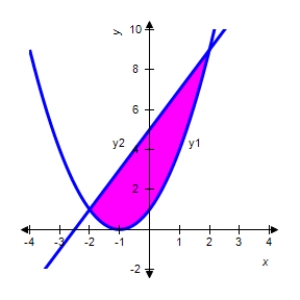
A)
B)
C)
D)
E)
 and
and  .
. 
A)

B)

C)

D)

E)


Unlock Deck
Unlock for access to all 90 flashcards in this deck.
Unlock Deck
k this deck
73
Find the volume of the solid generated by revolving the region bounded by the graphs of the equations about the x-axis.Verify your results using the integration capabilities of a graphing utility.  ,
,  ,
,  ,
, 
A)
B)
C)
D)
E)
 ,
,  ,
,  ,
, 
A)

B)

C)

D)

E)


Unlock Deck
Unlock for access to all 90 flashcards in this deck.
Unlock Deck
k this deck
74
A tank on the wing of a jet aircraft is formed by revolving the region bounded by the graph of  and the x-axis
and the x-axis  about the x-axis,where x and y are measured in meters.Find the volume of the tank.Round your answer to two decimal places.
about the x-axis,where x and y are measured in meters.Find the volume of the tank.Round your answer to two decimal places.
A)0.37 m3
B)0.45 m3
C)0.18 m3
D)0.68 m3
E)0.34 m3
 and the x-axis
and the x-axis  about the x-axis,where x and y are measured in meters.Find the volume of the tank.Round your answer to two decimal places.
about the x-axis,where x and y are measured in meters.Find the volume of the tank.Round your answer to two decimal places. A)0.37 m3
B)0.45 m3
C)0.18 m3
D)0.68 m3
E)0.34 m3

Unlock Deck
Unlock for access to all 90 flashcards in this deck.
Unlock Deck
k this deck
75
Find the area of the region bounded by the graphs of the algebraic functions. 

A)
B)
C)
D)
E)


A)

B)

C)

D)

E)


Unlock Deck
Unlock for access to all 90 flashcards in this deck.
Unlock Deck
k this deck
76
Find the volume of the solid generated by revolving the region bounded by the graphs of the equations about the line  .
.  ,
,  ,
, 
A)
B)
C)
D)
E)
 .
.  ,
,  ,
, 
A)

B)

C)

D)

E)


Unlock Deck
Unlock for access to all 90 flashcards in this deck.
Unlock Deck
k this deck
77
Find the volume of the solid generated by revolving the region bounded by the graphs of the equations  ,
,  ,
,  ,and
,and  about the x-axis.Round your answer to four decimal places.
about the x-axis.Round your answer to four decimal places.
A)3.6882
B)10.7186
C)20.6134
D)14.3360
E)37.8922
 ,
,  ,
,  ,and
,and  about the x-axis.Round your answer to four decimal places.
about the x-axis.Round your answer to four decimal places. A)3.6882
B)10.7186
C)20.6134
D)14.3360
E)37.8922

Unlock Deck
Unlock for access to all 90 flashcards in this deck.
Unlock Deck
k this deck
78
Find the volume of the solid generated by revolving the region bounded by the graphs of the equations about the line  .
.  ,
,  ,
, 
A)
B)
C)
D)
E)
 .
.  ,
,  ,
, 
A)

B)

C)

D)

E)


Unlock Deck
Unlock for access to all 90 flashcards in this deck.
Unlock Deck
k this deck
79
Find the area of the region bounded by equations by integrating (i)with respect to x and (ii)with respect to y. 

A)
B)
C)
D)
E)


A)

B)

C)

D)

E)


Unlock Deck
Unlock for access to all 90 flashcards in this deck.
Unlock Deck
k this deck
80
Find the volume of the solid generated by revolving the region bounded by the graphs of the equations about the x-axis.  ,
,  ,
,  ,
, 
A)
B)
C)
D)
E)
 ,
,  ,
,  ,
, 
A)

B)

C)

D)

E)


Unlock Deck
Unlock for access to all 90 flashcards in this deck.
Unlock Deck
k this deck


